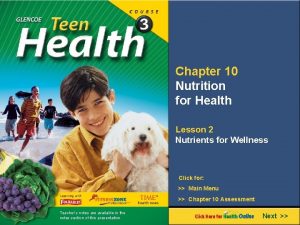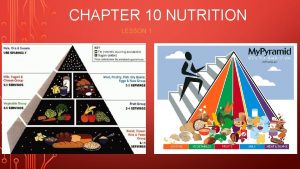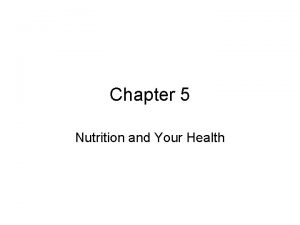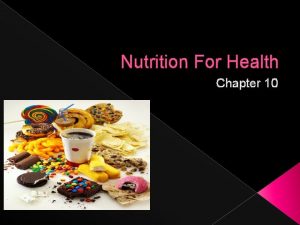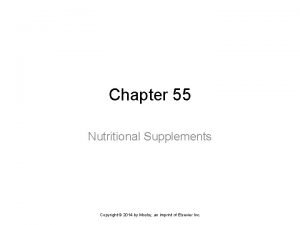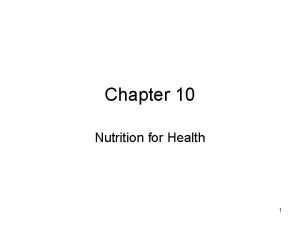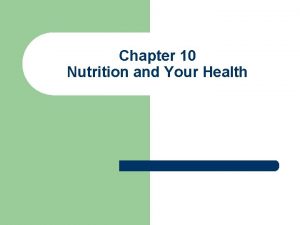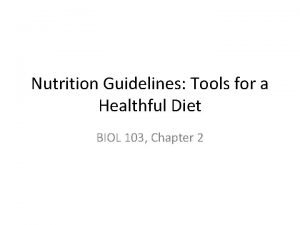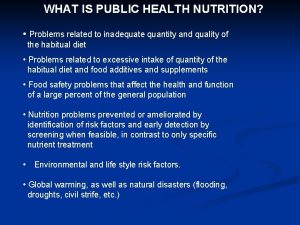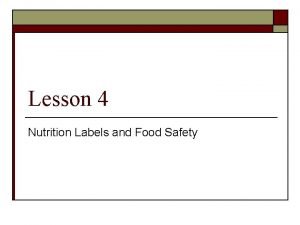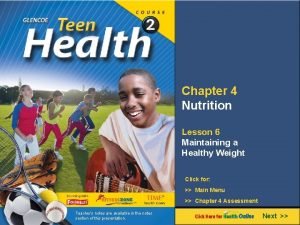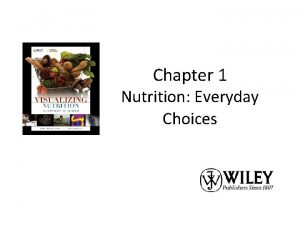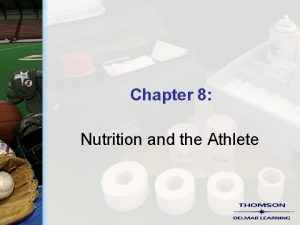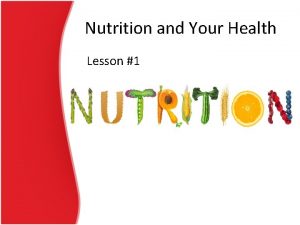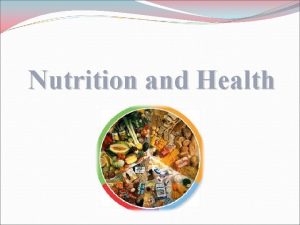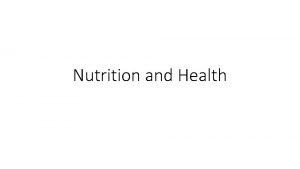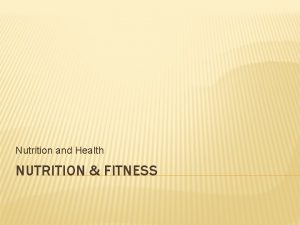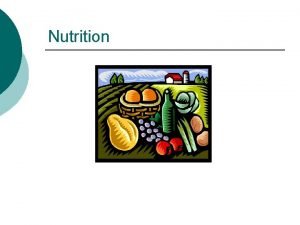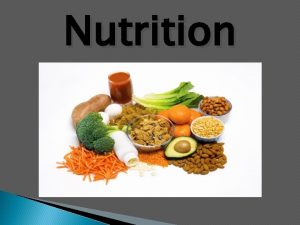Chapter 10 Nutrition for Health 1 Lesson 1
















- Slides: 16

Chapter 10 Nutrition for Health 1

Lesson 1 The Importance of Nutrition 2

Journal #2 • K-W-L Chart – Know about nutrition – Want to know about nutrition – Learned about nutrition • Make a three column chart. First column is the K, second column is W, and the third column is the L 3

Why Nutrition Matters • The food you eat affects your health and quality of life • Nutrition – The process by which your body takes in and uses food • Nutrients – Substances in food that your body needs to grow, repair itself, and to supply you with energy • Calorie – A unit of heat used to measure the energy your body uses and the energy it receives from food 4

Good Nutrition Helps • Nutrition affects your lifelong health • Eating a variety of healthful foods can help you avoid unhealthful weight gain and other diseases such as: – Cardiovascular disease – Stroke – Certain cancers – Osteoporosis – Type 2 diabetes 5

What Influences Your Food Choices • Hunger and Appetite – Hunger • The natural physical drive to eat, prompted by the body’s need for food – Appetite • Psychological (directed toward the mind) desire for food • Food and Emotions – Some people eat in response to an emotional need • Stress, frustration, lonely, or sad • Food and Your Environment – – Family and culture Friends Time and Money Advertising 6

Journal #3 • Keep a detailed FOOD LOG for ONE week • Analyze influences to make better food choices – Food Log is detailed and complete – Lists at least one influence for each entry – Identifies at least one factor that generally influences food choices – Creates a healthy eating plan 7

Lesson 2 Nutrients 8

Giving Your Body What It Needs • Nutrients perform specific roles to help maintain the way your body functions • How does you body use nutrients? – – – As an energy source To heal, and build and repair tissue To sustain growth To help transport oxygen to cells To regulate body functions • Six types of nutrients – Energy = Carbohydrates, Proteins, and Fats – Other Functions = Vitamins, Minerals, and Water 9

Carbohydrates • Starches and Sugars found in foods which provide your body’s main source of energy – 45 to 65 percent of your daily calories should be from carbohydrates • Types: – Simple = Fructose and Lactose (fruits & milk) – Complex = Starches, long chains of sugars linked together (grains, grain products = bread, pasta, beans, and root veggies) – Fiber = tough complex carbohydrate that the body CANNOT digest • Eat 20 to 35 grams per day • Fruits & Vegetables, whole grains, nuts, seeds, legumes 10

Role of Carbohydrates • Body breaks them down into their simplest form • Most are turned into a simple sugar called glucose • Glucose – Mains source of fuel for the body’s tissues – Stored in your body’s tissue and used later • • Benefits of Fiber Body CANNOT digest Aids in digestion Reduces the risk of disease 11

Proteins • Nutrients the body uses to build and maintain its cells and tissues • Proteins are made up of amino acids • Essential Amino Acids – The nine amino acids we get from food, the rest our body produces • Other Proteins are from animal sources – Meats, eggs, dairy – Complete Proteins • Contain all nine essential amino acids • Also get protein from plant-based foods like grains, nuts, seeds, and legumes (need to eat a variety to get all 9 amino acids) 12

Role of Proteins • Basic building material of all your body cells • Helps your body grow – During major growth periods, such as infancy, childhood, adolescence and pregnancy, the body builds new cells and tissue from amino acids in proteins • Provides the body with energy (not the main source) • Replaces damaged or worn-out cells by making new ones from proteins • Carries oxygen through the blood to parts of the body • Function as hormones • Hormones-regulate the activities of your various body systems • 10 to 15 percent of your total daily calories • 46 grams per day for teenage girls 13

Fats • Your body needs a certain amount of fat in order to function properly • Types – Unsaturated fats • Vegetable oils, nuts, and seeds • Reduce the risk of heart disease – Saturated fats • Animal based foods and many dairy products • Increase the risk of heart disease – Trans fat • Hydrogenation = causes vegetable oil to harden • As it hardens it becomes more saturated 14

Role of Fats • Concentrated form of energy • Brain development, blood clotting, and controlling inflammation • Maintain healthy skin and hair • Absorb and transport fat-soluble vitamins through the blood stream • Calories from fats that you do not use store in the body – Adipose tissue = stored fat • Cholesterol – Waxy, fatlike substance in your blood • Teens consume less than 25 to 35 percent of their calories from fats 15

Other Types of Nutrients • Vitamins – Compounds found in food that help regulate many body processes • Water-Soluble – B, C, & Folic Acid • Fat-Soluble – A, D, E, & K • Minerals – Elements found in food that are used by the body • Your body does not produce minerals • Important ones for you – Calcium, Phosphorus, Magnesium, & Iron • Water – Functions: • Moving food through the digestive system • Digesting carbohydrates and protein, and aiding in other chemical reactions in the body • Transporting nutrients and removing wastes • Storing and releasing heat • Cooling the body through perspiration • Cushing the eyes, brain, and spinal cord • Lubricating the joints 16
 Chapter 10 nutrition for health
Chapter 10 nutrition for health Chapter 10 lesson 4 nutrition labels and food safety
Chapter 10 lesson 4 nutrition labels and food safety Overall state of well being or total health
Overall state of well being or total health Chapter 5 nutrition and your health
Chapter 5 nutrition and your health Chapter 10 nutrition for health vocabulary practice
Chapter 10 nutrition for health vocabulary practice Chapter 55 nutrition and health
Chapter 55 nutrition and health Chapter 10 lesson 1 health
Chapter 10 lesson 1 health Chapter 10 lesson 4 nutrition labels and food safety
Chapter 10 lesson 4 nutrition labels and food safety Ul tolerable upper intake level
Ul tolerable upper intake level Nutrition in primary health care
Nutrition in primary health care Project title for health and nutrition
Project title for health and nutrition What is nutritional health
What is nutritional health Public health nutrition problems
Public health nutrition problems Introduction to public health nutrition
Introduction to public health nutrition Datingoo
Datingoo Lesson 6 anorexia nervosa and bulimia
Lesson 6 anorexia nervosa and bulimia Chapter 4 body weight and composition answer key
Chapter 4 body weight and composition answer key
